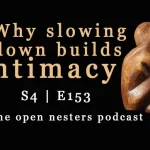PACT (Psychobiological Approach to Couple Therapy) helps couples like Bob and Sandra navigate differences in sexual desire by slowing down and understanding each other’s feelings. They learn that Bob’s fear of rejection and Sandra’s fear of confrontation are rooted in past experiences. Through playful exercises, they practice new ways of initiating and declining intimacy that prioritize connection over outcome, creating a safer space for emotional and sexual closeness.
When a Couple Desires More Intimacy
Helping couples enhance their sensual connection by focusing on sensuality rather than sexual performance. Key to this approach is differentiation, where each partner maintains their individuality while staying connected. Through slowing down and fostering deeper understanding, the therapist guides couples to build a more satisfying and intimate relationship.
Beyond the Ick Factor: Deeper Healing for Issues of Sexuality
Couples seeking therapy for sexual issues often have deeper, underlying problems like the “ick factor”—a repulsion to a partner’s smell, taste, or touch. This can stem from early life experiences and psychobiological responses. Understanding these roots allows for more effective healing. For instance, Donna and Marcy overcame challenges with intimacy by addressing Donna’s past trauma, leading to a stronger connection.
Working Bottom Up in PACT
Bottom-up interventions in PACT therapy use body language and eye contact to create connection, focusing on the nervous system rather than long conversations. For example, guiding a couple like Sam and Margaret to adjust their interactions—like offering warm greetings and making eye contact—helped them reconnect emotionally and physically. These methods emphasize real-time adjustments, making it easier for couples to rebuild intimacy.
Why Slowing Down Builds Intimacy
The Open Nesters Podcast interviews Dr. Karen Berry.




